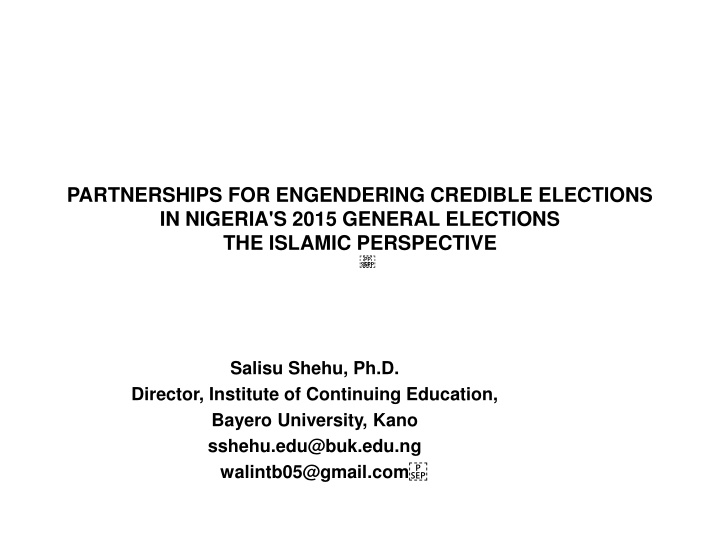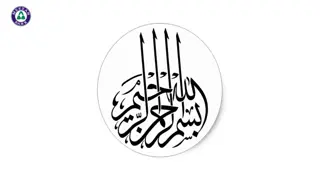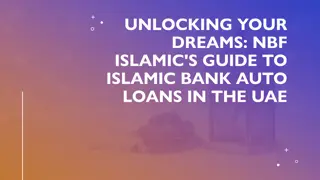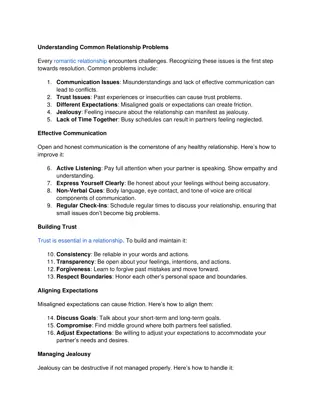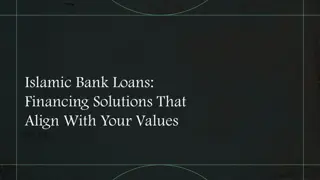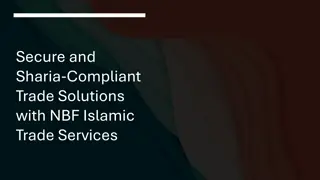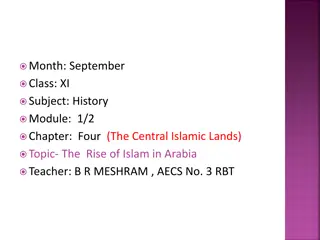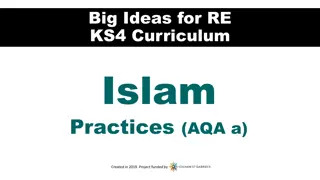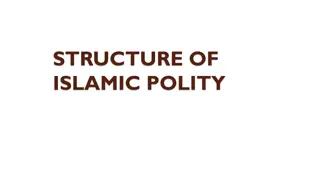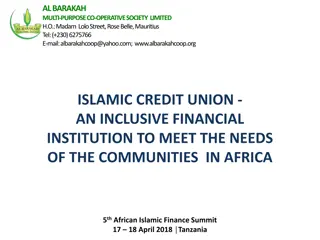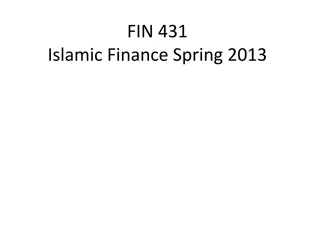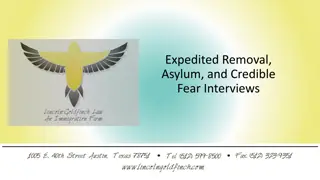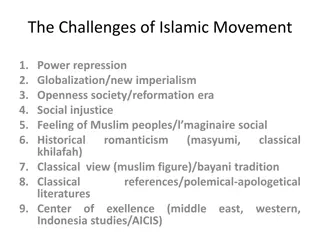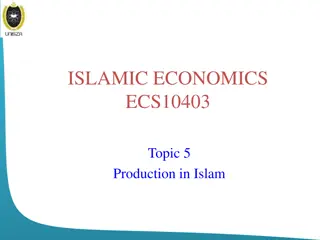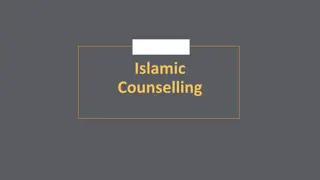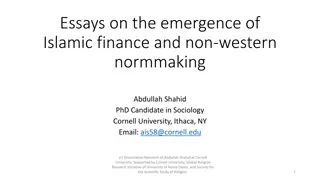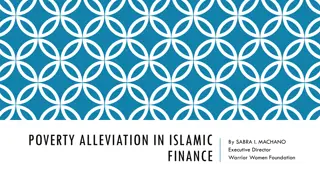Partnerships for Engendering Credible Elections in Nigeria's 2015 General Elections: The Islamic Perspective
The quest for credible elections in Nigeria is crucial for forging responsible leadership and good governance. This article explores the Islamic perspective on forming partnerships to ensure free, fair, and credible elections, highlighting the importance of historical frameworks, interfaith collaboration, and stakeholder engagement. Recommendations are provided to enhance the electoral process and promote social justice in Nigeria.
Download Presentation

Please find below an Image/Link to download the presentation.
The content on the website is provided AS IS for your information and personal use only. It may not be sold, licensed, or shared on other websites without obtaining consent from the author.If you encounter any issues during the download, it is possible that the publisher has removed the file from their server.
You are allowed to download the files provided on this website for personal or commercial use, subject to the condition that they are used lawfully. All files are the property of their respective owners.
The content on the website is provided AS IS for your information and personal use only. It may not be sold, licensed, or shared on other websites without obtaining consent from the author.
E N D
Presentation Transcript
PARTNERSHIPS FOR ENGENDERING CREDIBLE ELECTIONS IN NIGERIA'S 2015 GENERAL ELECTIONS THE ISLAMIC PERSPECTIVE Salisu Shehu, Ph.D. Director, Institute of Continuing Education, Bayero University, Kano sshehu.edu@buk.edu.ng walintb05@gmail.com
INTRODUCTION The essence of democratization is the entrenchment of responsible leadeship and good governace, which unfortunately have been most elusive in Nigeria. In the dominant strand of democracy in the world today elections have remained, in spite of their various patterns, the principal process for instituting leadership and conferring political mandate and authority. Elections in Nigeria have largely been a charade
Bearing in mind the violence that engulfed the country after the 2011 elections because of perceived election rigging and having been assaulted by the monumental corruption and impunity and insensitivityy that characterized the leadership ushered in by the election (2011), the frightening growth of insecurity and accentuation of centrifugal and centripetal trends the 2015 elections appears to have generated the greatest anxiety as well as fear in the minds of ordinary Nigerians . As a result of the overview made above, it can as well be asserted that the quest and struggle for social justice and responsible leadership Nigeria have, therefore, significanty centred around the imperatives and strategies for engendering free, fair and credible elections, as the most reliable means and instrument for ushering good governance.
There are many ways of engendering credible elections, and indeed concerted efforts of all stakeholders is one effective, if not the most effective fighting rigging and elections malpractices. This paper attempts to present the Islamic perspective of partnerships tfor the purpose of engendering credible elections.
OUTLINE The importance of elections in democracy What constitutes free, fair and credible elections Credible elections, political mandate and legitimacy, development and security: Nigeria in perspective Challenges to credible elections and the imperative of political participation and partnerships The Importance of leadership, political authority and the essence of politics in Islam The Islamic frameworks for building partnershps for credible elections Historical framework for building partnership for credible elections Dimensions of parnerships: Interfaith partnership in focus Identifying the stakeholders in elections: Defining the scope of partnerships Activities, tasks and issues involved in the partnerships Conclusion Recommendations
The importance of elections in democracy Election is the process through which the people selecttheir leaders, often through voting. Elections are an integral part of democracy and their significance in democratization process cannot be over emphasized. Annan (2012) for example, asserts that, "elections are the most indispensable root of democracy. They are now almost universal". The same assertion was made in the report of a National Conference
What constitutes free, fair and credible elections An election, according to Dukawa (2015), "is free when and if every interested eligible candidate is allowed to contest; it is fair when rules and regulations governing its conduct are dispassionately applied; and it is credible when its outcome is generally accepted". The sum total of the above is what the Global Commissions on Elections calls, "Elections with Integrity". It goes on to define it saying, "We define an election with integrity as any election that is based on the democratic principles of universal suffrage and political equality as reflected in international standards and agreements, and is professional, impartial, and transparent in its preparation and administration throughout the electoral cycle".
Credible elections, political mandate, legitimacy, development and Elections are the most essential means for popular participation in politics and democratization. They are therefore, the most significant instruments for confering political legitimacy and mandate. Elections in this regard can be described both as an agent and process of popular participation in governance. Habu (2012) submits that there is a link between develpment and popular participation.
But in more categorical, definitive and instructive terms the Global Commission on Elections asserts that evidences around the world suggest that elections if credible, deepen democracy, bring about development and security. It says: "For elections to embody democracy , further development and promote security, they must be conducted with integrity. Where elections have integrity, the bedrock of democrtic principle of political equality is honoured, ccitizens select their leaders and hold them accountable. Where elections lack integrity, politicians, officials and institutions are not accountable to the public., which is denied equal opprtunity to participate and influence the political process. Public confidence in elections will be weak, and governments will lack legitimacy.
IN THE NIGERIAN CONTEXT it is clear that the incessant assault against popular manadate occasioned by persistent rigging and electoral fraud can safely be claimed to be principally responsible for all tsocio-political malaise and insecurity that the country has been bedevilled with. Habu (2012) maintains that, since the return to democratic rule in 1999, Nigeria has been suffering the onslaughts of "flawed electoral process". He says: "Elections in Nigeria's Fourth Republic has become a charade. There was no sign of improvement in 1999 and 2003. Theworst was that of 2007 which local and international observers overwhelmingly regarded as the direct assualt on democracy. Although some sorts of moderation have been (sic) been exercised by the political class in the 2011 elections, the process and its outcome is still being debated." In the light of these unworthy realities, it becomes imperative to explore all necessary means and instruments for engendering credible elections in Nigeria. Undoubtedly, one very potent means is cooperation and partnerships among all stakeholders for that particular purpose. While a number of writers have established the necessity and efficacy of partnership for credible elections, this paper attempts to open a new vista to the discourse by propunding the Islamic perspective.
AT the global level five major challenges must be overcome to conduct elections with integrity: building the rule of law to substantiate claims to human rights and electoral justice; building professional, competent electoral management bodies (EMBs) with full independence of action to administer elections that are transparent and merit public confidence; creating institutions and norms of multiparty competition and division of power that bolster democracyas a mutual security system among political contenders . removing barriers legal, administrative, political, economic, and social to universal and equal political participation; and regulating uncontrolled, undisclosed, and opaque political finance
